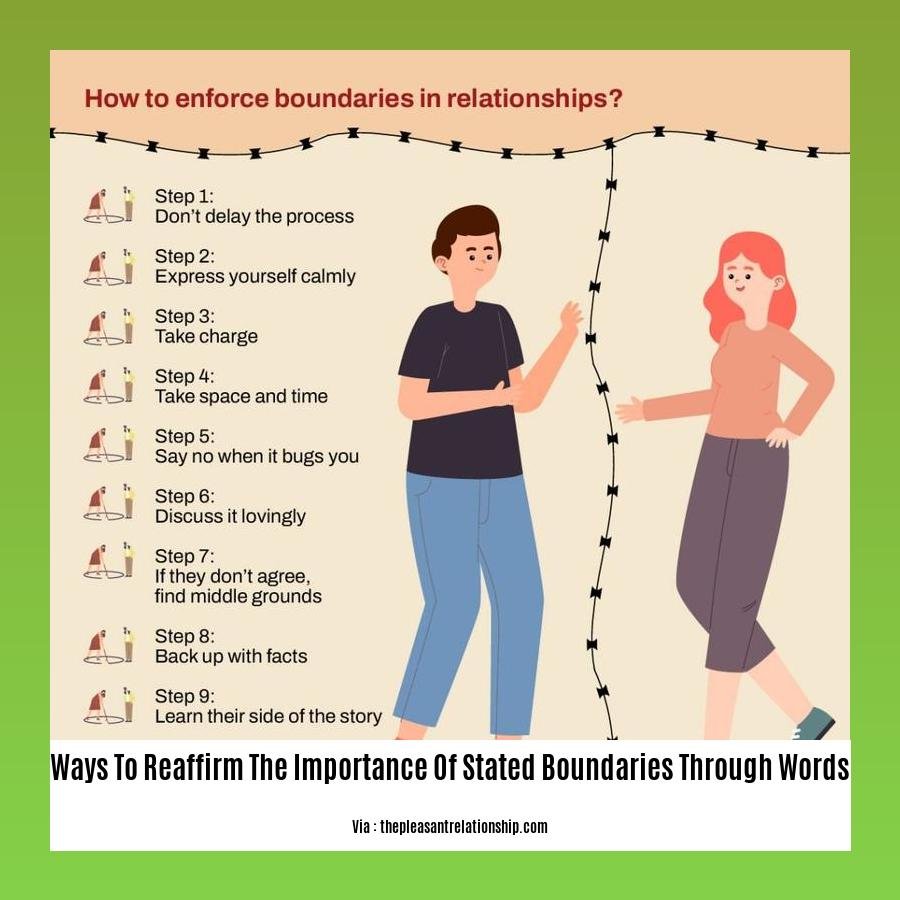Clear communication is essential for establishing and maintaining healthy boundaries. [Ways to Reaffirm the Importance of Stated Boundaries Through Words] will provide actionable strategies for using words to effectively communicate your needs and expectations.
Key Takeaways:

- Identify your reasons for setting boundaries.
- Start small and gradually implement boundaries.
- Prioritize self-care and put your needs first.
- Establish boundaries early on in new relationships to avoid misunderstandings.
Ways to Reaffirm the Importance of Stated Boundaries Through Words
Words are powerful; when used skillfully, they can set clear boundaries and avoid misunderstandings. Here are some effective methods for reinforcing your boundaries:
1. Express boundaries respectfully: Use “I” statements to express your needs or limits. For example, instead of saying “You can’t come over,” try “I’m not comfortable with you coming over unannounced.”
2. Use assertive body language: Maintain eye contact, stand up straight, and speak with a clear, confident voice. This nonverbal communication adds weight to your words.
3. Actively listen to feedback: When someone questions or challenges your boundaries, actively listen to their perspective. Empathize with their emotions, but remain firm in upholding your limits.
4. Provide specific examples: Avoid using vague or abstract language when setting boundaries. Instead, provide concrete examples of behaviors that are not acceptable.
5. Use repetition: If someone repeatedly violates your boundaries, calmly and persistently reiterate your limits. This reinforces the importance of respecting your needs.
6. Be consistent: Maintain your boundaries consistently, even when it’s challenging. This demonstrates that you are serious about upholding your limits.
7. Seek support: If you struggle to enforce your boundaries, seek support from a therapist, counselor, or trusted friend. They can provide emotional support and strategies for assertive communication.
Leveraging these techniques can effectively reaffirm your boundaries and foster healthier relationships.
-
Communicating respect for each other’s boundaries consistently fosters healthy and fulfilling relationships.
-
Build stronger connections by communicating care for limits even through disagreement.
-
Effective communication is key – approach boundary discussions with empathy to create a positive and respectful dialogue.
Explain the consequences of crossing your boundaries
Boundaries are essential for maintaining healthy relationships and protecting our well-being. When someone crosses our boundaries, it can be incredibly frustrating and hurtful. It’s important to understand the consequences of crossing boundaries so that we can take steps to protect ourselves.
One of the most common consequences of crossing boundaries is that it can lead to conflict. When someone crosses our boundaries, we may feel angry, resentful, or even betrayed. This can lead to arguments, disagreements, and even physical altercations.
Another consequence of crossing boundaries is that it can damage trust. When someone crosses our boundaries, it shows that they don’t respect our needs or feelings. This can make it difficult to trust them in the future.
Finally, crossing boundaries can also lead to emotional distress. When someone crosses our boundaries, it can trigger feelings of anxiety, depression, and even PTSD. This can have a significant impact on our mental and emotional health.
It’s important to remember that everyone has different boundaries. What is acceptable for one person may not be acceptable for another. It’s important to communicate our boundaries clearly and respectfully, and to expect others to do the same.
Key Takeaways:
- Crossing boundaries can lead to conflict.
- Crossing boundaries can damage trust.
- Crossing boundaries can lead to emotional distress.
- It’s important to communicate our boundaries clearly and respectfully.
- It’s important to expect others to respect our boundaries.
Source: 5 Tips for When People Cross Your Boundaries
Use Body Language to Reinforce Your Boundaries
Nonverbal cues can significantly enhance the assertiveness of your words when setting and enforcing boundaries.
Key Takeaways:
-
Establishing Boundaries: Use body language, such as direct eye contact and an upright posture, to convey confidence and assertiveness when setting boundaries.
-
Reacting to Boundary Violations: When boundaries are violated, use non-confrontational body language, such as avoiding prolonged eye contact or crossing your arms, to discourage further encroachment.
-
Body Language for Self-Respect: Maintain a relaxed and composed posture, conveying a sense of self-worth and respect for your own needs.
-
Non-Verbal Consent: Use open and inviting body language, such as uncrossed arms and a warm smile, to indicate consent. Conversely, use closed and guarded body language, such as crossed arms or a furrowed brow, to express discomfort or disagreement.
Citation:
- Body Language for Setting Boundaries
Be consistent and persistent in enforcing your boundaries
When you set boundaries, you’re communicating your needs and limits to others. It’s important to be consistent and persistent in enforcing your boundaries so that others learn to respect them.
Here are some tips for being consistent and persistent in enforcing your boundaries:
-
Communicate your boundaries clearly and directly. Don’t be afraid to speak up for yourself and let others know what you’re comfortable with and what you’re not.
-
Be assertive. When someone crosses your boundaries, don’t be afraid to stand up for yourself and let them know that their behavior is not acceptable.
-
Set consequences. If someone repeatedly crosses your boundaries, you may need to set consequences. This could mean limiting your contact with them or even ending the relationship.
-
Don’t give up. It takes time and effort to enforce your boundaries. Don’t get discouraged if people don’t respect them at first. Keep communicating your boundaries and enforcing them consistently, and eventually, people will learn to respect them.
Key Takeaways:
- Communicate your boundaries clearly.
- Be direct and assertive.
- Set consequences and enforce them consistently.
- Don’t give up on enforcing your boundaries.
Citation:











